#narcissus' demise
Text
ME WHEN I POST SOMETHING WITH CONFUSED WORDS AND LEAVE IT UP FOR HOURS WITHOUT NOTICING I'M SO EMBARRASSED ????
#whenever i'm thinking i can usually kinda-ish understand what i'm thinking but the words in my head aren't semantically correct#or they sound similar but distinct from another word that would make more sense#and sometimes it gets into my writing and speech and i don't notice#i did not notice i wrote “mind” instead of “live” bcs they both have “i” in it in my last post until someone liked it and now i'm distraught#i feel like a fool#narcissus' demise#rip </2
1 note
·
View note
Text


we already know Death shows up whenever Puss is on the brink of him AKA im concluding he was going to die a la Narcissus in this cave (see: we already saw he stayed longer than he should have just to sing songs with himself)
Ideally his reflections wouldve kept him on Feel Good Wagon until his demise but when Puss had the strength to walk away, for Kitty and Perrito, they pivoted real hard to shaming and belittling him and trying to break his spirit by hitting those soft spots. Which i could see as a viable tactic to freeze a weaker man, cat, by guilt or insecurity but i think the resolve to walk out was strengthened since he had found closure with Kitty and we know that *he* knows he has nothing to lose on this quest since living without the wish = Mama Luna's (at this point i dont think realized he was actually living for his friends)
1K notes
·
View notes
Text
There are two major versions of the story of Narcissus. The first is the one everyone knows about, where Narcissus rejects the nymph Echo, who fades away after he rudely rejects her.
The other one that always gets censored by modern writers involves a young man by the name of Ameinias, who confesses his love to Narcissus. Narcissus hands him or mails him a sword, telling him to kill himself. Ameinias as revenge for this incredibly terrible rejection does kill himself. Right on Narcissus’ doorstep. And he uses his dying curse to curse Narcissus to die feeling the same longing and pain that he’s inflicted on all the people he’s rejected so harshly.
And Narcissus does die according to Ameinias’ curse. He sees his own reflection for the first time in a pond shortly after, and knowing that he can never have a relationship with himself, commits suicide by the pond, dying in the same way he had told Ameinias to die.
Narcissus sucked either way. And the Echo version is still compelling. As are all the versions where he either drowns or wastes away, paralleling the demise of Echo. But other major variations of myths aren’t usually glossed over the way Ameinias often is. It’s homophobia. We all know it’s homophobia. Poor Echo and Ameinias both deserve better. In the world of their tragedies and in the way that storytellers treat them.
786 notes
·
View notes
Note
Random question. Which persona charts (or any other Astro placements) highlights a persons strengths, weaknesses, personal development, and path to self improvement?? Thank you.
how to discover your strengths, weaknesses, and how to improve using asteroid persona charts
i smiled when i read "random question" i was like oh boy... they are gonna ask me what my favorite color or type of potato is... NOPE this question is not random at all for this blog. i'm going to work off of what i already have posted (no asteroids discussed after this post will be added after the posted date).
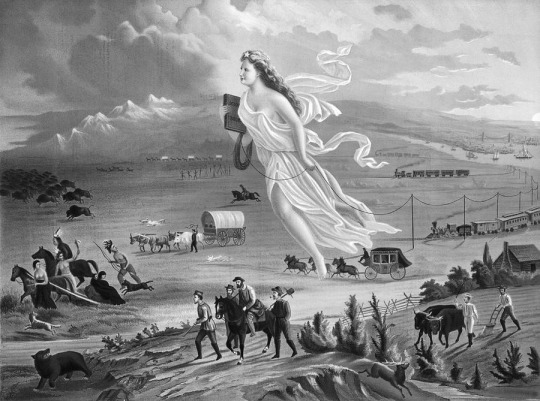
strengths (check the jupiter placement/aspects and sagittarius/pisces ruled houses for the following asteroid persona charts)
abundantia (151): where you are most abundant in life and receive a bunch of gifts while also rewarding others
achaemenides (5126): he had a strong power of will and was capable of perseverance
atalanta (36): strengths/capabilities as a woman - breaking the norms of gender expectations
constantia (315): consistency often breeds success and strengths
hehe (200002): where you have a lot of harmony/positivity in life
heracles (5143): what tasks you completed / will complete because you are strong and determined
hilaritas (996): resilience despite everything around you going poorly
lysistrata (897): leadership qualities and power over a group
themis (24): power and ability to see right from wrong
weakness (check the saturn placement/aspects and capricorn/aquarius ruled houses for the following asteroid persona charts)
achilles (588): a flaw you have that can break you down if not improved upon
cucula (2731): repetition and routine is often a person's greatest weakness (i say this as someone who studied forensic psychology with a lead investigator who works with serial killers)
icarus (1566): a mindset that could lead to your demise
lacrimosa (208): thoughts/experiences that hold you back because you are still upset over them
midas (1981): where your life is set to change from riches to rags because of greed
narcissus (37117): where your selfishness is your weakness/flaw
niobe (71): where you are too cocky and you experience a downfall because of it
tantalus (2102): where your superior mentality holds you back
how to improve (check the jupiter placement/aspects and sagittarius/pisces ruled houses for the following asteroid persona charts)
ambrosia (193): the food of the gods - the more you eat the more immortal you become - the more you act in this area (these areas) the better life gets for you
chiron (2060): he was the wounded healer - if anyone knows about improving it is him
dante (2999): dante journeyed from hell to heaven to be good enough for beatrice - it can show you the improvement(s) you make for others / those you love
eureka (5261): a discovery that can change your life
isis (42): how you can heal
karma (3811): the balancing factor in your life
medusa (149): how you can turn your bad actions around to receive remorse from others
odin (3989) / wodan (2155): what you'd do to learn how to improve
pandora (55): the balance of positives and negatives in your life
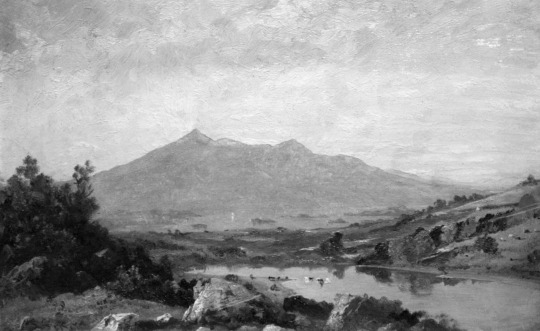
like what you read? leave a tip and state what post it is for! please use my "suggest a post topic" button if you want to see a specific post or mythical asteroid next!
click here for the masterlist
want a personal reading? click here to check out my reading options and prices!
© a-d-nox 2023 all rights reserved
#astrology#astro community#astro placements#astro chart#asteroid astrology#asteroid#natal chart#persona chart#greek mythology#astrology tumblr#jupiter persona chart#abundantia#achaemenides#atalantia#constantia#hehe#heracles#hilaritas#lysistrata#themis#achilles#cucula#icarus#lacrimosa#midas#narcissus#niobe#tantalus#ambrosia#chiron
143 notes
·
View notes
Text

Nemesis from Greek mythology.
According to Hesiod's Theogony, Nemesis was one of the children of Nyx alone. Nemesis has been described as the daughter of Oceanus, Erebus, or Zeus, but according to Hyginus, she was a child of Erebus and Nyx. Some made her the daughter of Zeus by an unnamed mother. In several traditions, Nemesis was seen as the mother of Helen of Troy by Zeus, adopted and raised by Leda and Tyndareus.
In the Greek tragedies, Nemesis appears chiefly as the avenger of crime and the punisher of hubris, and as such is akin to Atë and the Erinyes. She was sometimes called Adrasteia, probably meaning "one from whom there is no escape."
One of the most well-known stories associated with Nemesis involves the hero Narcissus. Narcissus was known for his extraordinary beauty but was also extremely proud and dismissive of those who loved him. Nemesis punished Narcissus by causing him to fall in love with his own reflection, leading to his eventual demise as he couldn't tear himself away from the reflection in a pool of water.
Follow @mecthology for more myths and legends.
DM for pic credit.
Source: Wikipedia and AI.
61 notes
·
View notes
Text
It began with the narcissus flower.
Narcissus, a man whose love for his own mirror image ultimately led to his demise. It is a tale oft repeated by parents to their children, warning them to remain untainted by vanity.
"It is a curse," Lysandra's mother had told her the moment she'd begun her ascension into womanhood. Her mother held onto her shoulders as they stood at the edge of the washing pool together. Lysandra remembers this as the first time she had felt shy in the public pools, hyperaware of the beginnings of breasts forming on her young chest. "Unless you wish to bring Aphrodite's ire upon you, or suffer the same fate as that foolish man, you'd best tamp down any arrogant feelings that begin to fester."
Lysandra has never thought herself vain, always the one to remain neutral during the other handmaidens' titterings about who will gain the hand of a nobleman.
She has, however, caught herself wondering if Narcissus would have suffered the same fate if his unwavering attention had been focused upon the image of another. If Narcissus had instead fallen in love with a nymph, and spent his hours gazing upon her features until he withered away to nothing.
Lysandra often wonders if this is the fate she may suffer, before bidding such childish thoughts from her mind. Afterall, children's tales do not tell of lowly handmaidens.
The narcissus flower is one Lysandra has never been fond of, and she's unsure if this distaste began before or after her mother had clutched her young shoulders like a harpy gripping a shuddering salmon.
Nonetheless, she can understand why Persephone had kneeled in the soft, dew-speckled grass to admire the flower. The way the warm morning light reflected its amber glow? The petals reaching towards the sun, appearing as though they had only just unfurled, fated for Persephone's admiring gaze? If Lysandra thought him capable of such artistry, she might believe Hades created this flower himself to entice the maiden.
Regardless, Lysandra feels nothing but contempt for narcissus – the flower, and the senseless man.
(Unwillingly, she feels the very same contempt for herself – for allowing her mother to so strongly sway her feelings for a measly flower, and for believing herself different than a man who simply felt love too strongly.)
Just a little something I'm working on! I was reading about the myths of Greek sirens and Persephone's handmaidens and got some ideas...
#lysandra#writing#writeblr#creative writing#writer#original writing#fiction#excerpt#short fiction#short story#my writing#greek mythology#greek myth#persephone#hades and persephone#greek retelling#myth retelling#myth and legend
48 notes
·
View notes
Text
Character Voice Tag Game
Rewrite the line in the voices of your OCs, then pick a new line and pass it on!
My line is: “You’ll regret this.” (Open tag from @touloserlautrec) Doing this for the characters in the Seven Station Chronicles Book 1, if anyone is interested in another set of characters (later book or different WIP), feel free to let me know!
Belladonna: “I’m afraid I can’t allow you to do this.”
Cassie: “If you pull that shit, I’m going to deck you so fucking hard you’ll fly out an airlock.”
Nellie: “I don’t think you want to do that.”
Narcissus: “You’ll regret the day you ever crossed me, you vagrant. I will personally see to your demise and ruin for daring to make a mockery of me.”
Ricinus: “You should regret the day you were ever born.”
Goldenrod: “Darling, I don’t think you’ve really thought about the consequences of your actions. This won’t go well for you, you know that.” (Very patronizing tone)
Cassiopeia: “If you do this, I will make you regret it.”
Stellaris: “I, um, I wouldn’t do that if I were you.”
Rhys: “Are you sure that’s a good idea? You wouldn’t want to get in trouble.”
Tagging @modernwritercraft @spitefulbull @vyuntspakhkite-l-darling @illarian-rambling @aalinaaaaaa. Your line is: “I’m offended you’d say that to me.”
6 notes
·
View notes
Text
Would it be weird if i renamed my fursona to Narcissus. 🤔
I love how it's written in english, and it makes me think of developing my fursona more as character again. Something something a character driven only by cold sense of self and cruelty. Someone who looks on self so much it becomes their demise. Love that so much and i think they got the perfect vibes for it.
In the same time i fear someone could call me that name since fursonas are usually representation of self. I definitely wouldn't want to be called that lol
#Past few years i was in my 'let my fursona just simply represent me more' and now i'm back at 'what if they were a character' era ffs#My fursona is the mouse from my profile picture in case someone sees this and doesn't know btw :)#carpet talks#fursona
8 notes
·
View notes
Text
Gone Away Chapter 10
Stand on the Firing Line (Await Your Demise)
A Disc War Finale AU
Rating: Teen
Warnings: Creator Chose Not to Use Archive Warnings
Category: Gen
Relationships: c!Tubbo & c!Tommy, c!Sam & c!Tubbo, c!Dream & c!Tubbo
Chapter-specific warnings: Mentions of death/grief/mourning, references to religion, manipulation, dissociation, hallucinations/unreality
Tubbo withdraws further into himself and waits for the inevitable implosion. Dream was never going to let his crime go unpunished. He refused to repent on that island, and he was too much of a coward to recount his offense in front of the audience. That’s why Dream stuck around: to give Tubbo one last chance to submit to his sins and accept due justice, or to announce the revelation himself.
These are Tubbo’s last moments of freedom, and yet he’s ensnared as any rabbit with its foot broken in a bear trap.
(Or, the funeral continues.)
Read on AO3!
Taglist: @seaswalllow @thisisaname-whatahappyname @pandoraborn @sleepypuffpastry @isa-ghost @phantoids @a-humble-narcissus @cupsmp @cerhoney
#dsmp#tubbo#awesamdude#dream smp fanfiction#River's Writing#Gone Away#please let me know if you'd like to join my taglist!
20 notes
·
View notes
Text
Echoes of Thunder Rayla
Not to invoke Narcissus or anything but there's something here and I wanna talk about it.
Some background:
Echo and Narcissus is a pretty well known myth. It appears in Ovid's third book of Metamorphoses and tells the story of Narcissus, our main dude, who is often associated with narcissism and self-love (not the healthy kind), and the Oread Echo, cursed by Hera to be unable to speak except for repeating the last words of a sentence spoken by someone else. In the most well known version, Narcissus is out hunting with his pals and is separated from them where he catches the eye of Echo, who falls in love with him but can't tell him because of Hera's curse. When he calls, all Echo can do is repeat his words, and finally, when he says, "This way, we must come together,", Echo agrees, and runs into his arms. Narcissus, however, rejects her. By this time, he has caught his own reflection in a pool of water and is staring longingly at himself, eventually wasting away before it, obsessed with a love he can't have. In some versions, aka the version I was told when I was 8, Narcissus finds his reflection in the surface of a lake. Echo tries to warn him but he doesn't listen, and instead falls into the water and drowns.
At its shallowest, this is a story about not being sellf-obsessed, but obsession on its own is something to be considered also. In the myth, Narcissus' obsession with himself results in his forgetting to eat or drink, and his demise in one way or another.
We're not gonna call Callum a narcissist—that's not what's happening here at all—but there are parallels here we can't ignore. The reflection in Aaravos' mirror is the most obvious, but we know also that he has parallels to Viren and has grown a little obsessive about magic, and about the mirror in Rayla's absence. We also know that Rayla's come back, and that she's likely done so because she has information he needs to hear, but it's not unlikely that he won't heed her warnings. Who is she to try to help him, to warn him, when she left him, alone, for reasons she claimed were for his safety?
Callum and Rayla have been compared to a number of famous lovers and for good reason, but I think there's something here. There's something to be said about the concept of him ignoring the warnings of a rejected lover in favour of studying a reflection of himself, aka, in Aaravos' mirror.
35 notes
·
View notes
Text

Wednesday did not care for humanity. She’d rather fade into oblivion than cater to their sensibilities and have them worship her or build her temples.
Gods and goddesses faded with time if they were forgotten, she sort of wished her demise would hurry up as she couldn’t stand the banality of eternity.
Unfortunately, her grandmother was Antheia and she inherited her penchant for blooms.
Wednesday also loved flowers and created many beautiful blossoms.
If only the damn humans would stop picking them!
She attempted to create flowers that could defend themselves, such as the rose or thistle with their thorns and prickles, but it only served to make the humans love them more.
One day, Larissa, an aspect of Chloris berated her for making her flowers poisonous and killing humans.
Wednesday wondered why humans were always putting things in their mouths or eating them. She denied the poison was her doing.
Larissa demanded she figure out why her flowers were killing humans, or else she find herself transformed like Narcissus or Hyacinthus.
Wednesday begrudgingly obeyed as she knew the goddess was not bluffing. She waited in the field next to her grove.
To her surprise, she discovered Xavier, prince of the Underworld who escorted artists who died to the Afterlife, admiring her flowers and she could sense that they changed by being in Death’s presence.
She thought he would be arrogant and boring as all gods were, but instead she found a towering, shy, godling with eyes the colour of rose leaves and hair the colour of burnished oak, the same as her beloved grove.
She couldn’t help but laugh when he blushed and stuttered an apology when she notified him that the flowers he touched turned deadly and had killed a score of humans. He hadn't meant to hurt anyone or anything, he simply admired her work.
Some flowers were now poisonous and Larissa would have to accept that, as Wednesday had no plan to give up Xavier or banish him from her grove.
#Wenvier Moodboard#Wenvier#Wednesday Addams x Xavier Thorpe#Wednesday Addams#Xavier Thorpe#Larissa Weems#Reverse Underworld AU#Fanfic Inspo#Wenthorpe
19 notes
·
View notes
Text

PULCINELLA
the doppel of laughing, its form is a jack-in-the-box. the master of this emotion adores his doppel, and its power to grant him the freedom he so badly wishes for. anyone who hears its unending cacophony of laughter will inevitably join in, and will laugh until their demise when the doppel grows bored of them, and sends them into the depths of oblivion. afterwards, it continues to seek out new playmates to laugh along with, and the cycle continues.

NARCISSUS
the doppel of heartbroken longing, its form is a valet. the master of this emotion's heart breaks for one last time, before he succumbs to wallowing in the reflection of his own tears. as a result, this emotion seems to move as though on puppet strings, and continues the cycle of serving the wishes of a long lost beloved. however, with no orders to direct its actions, it lashes out and binds everything in silk, awaiting an order that will never come.

KING MAG-MELL
the doppel of broken promises, its form is a heavenly ruler. the master of this emotion loses all sense of reality and finds himself lost in thought of a perfect world made through his own volition. the doppel then warps the fabric of reality itself into an ideal kingdom. believing its rule is absolute and perfect, it subjects those it sees as opposition to its power to extreme punishment, before banishing them to the void of space.
#stuff i drew#doodles#body horror cw#insects cw#spider cw#i don't want to put these in any of the main tags but they're inspired by the doppels in magia record#these are old sorry i don't have any new stuff really#i've been super busy 😭#i might delete this later? it's not exactly the type of content i usually put here#idk i'll see
12 notes
·
View notes
Text
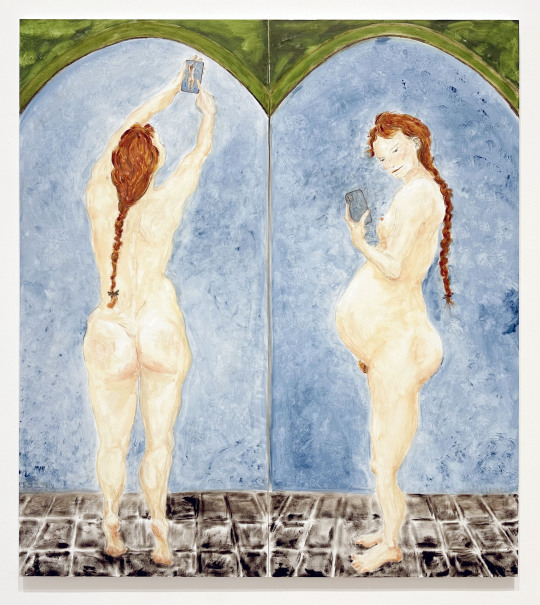
“New body, new body”, 2024, Oil and graphite on linen
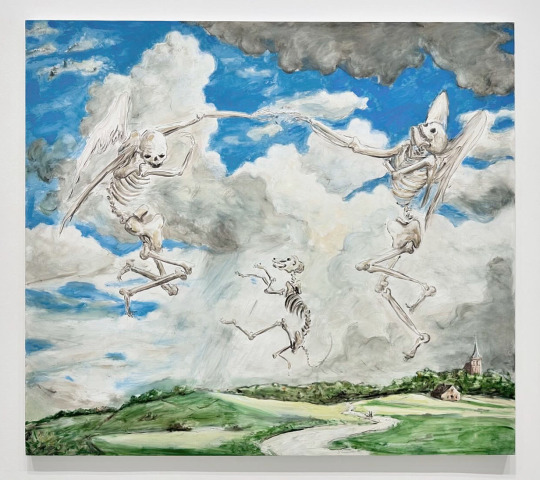
“Our family portrait/ Dancing over the town”, 2024, Oil and graphite on linen
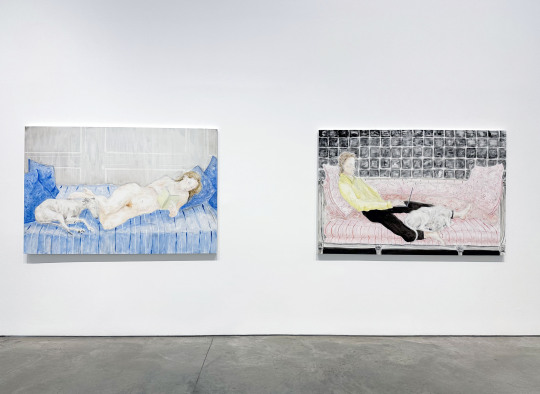
“In Bed” 2024, and “The world was different when Leonard painted Emily”, 2024, Oil and graphite on linen
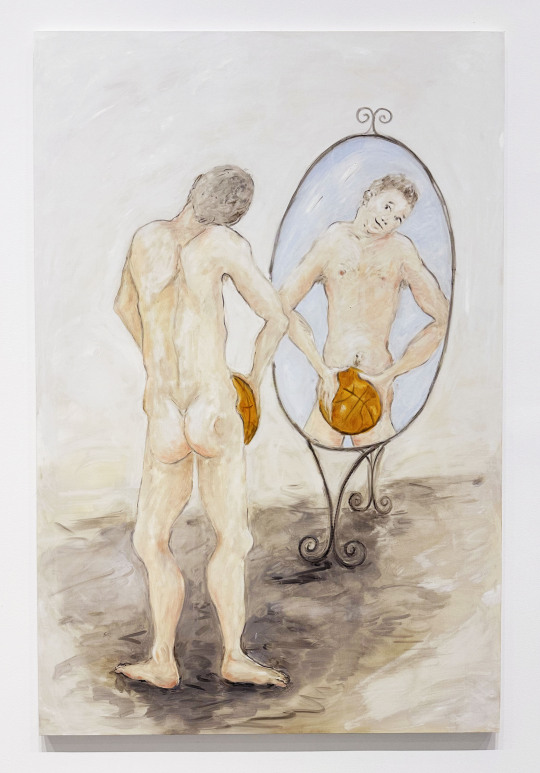
“I love basketball”, 2024, Oil and graphite on linen
Tanya Merrill’s exhibition, Watching women give birth on the internet and other ways of looking, at 303 Gallery explores the way we look at the world today, while referencing classical imagery from the past. What has changed in the way we see ourselves, our place in society, and our place in time? How much has changed because of self documentation and the internet? All of these questions feel even more prevalent now with technology and environmental issues moving at an accelerated pace.
From the press release-
True to her propensity for a cyclical and narrative installation, the show begins and ends with the creation of life. Each painting represents a diverse point of interest and concern to the artist— sexuality and ideas of fertility, the natural world and the fraught state of the environment, and the broader implications of contemporary technology, sports, and religion on the artist’s experience as a woman today.
The scale of the subjects in each canvas approximate life, creating a one-to-one perspective when standing in front of, say, a tree trunk, a cat perched on a fish tank, or a man admiring himself with a basketball. One work shows a trompe l’oeil stack of papers illustrating a 15th century manuscript: an early representation of a woman’s fertility cycle in relation to the stars. The modes for distributing images have changed, but the need to see them has not—jump ahead 800 years and the show’s namesake painting frames the edge of a computer screen, documenting the recent phenomenon of sharing one’s birthing story and corresponding photographs publicly on the internet.
Humans have always employed tools for looking. The earliest manufactured mirrors were made from volcanic glass in Turkey and date some 8000 years ago, the invention of the telescope advanced our understanding of Earth’s place in the cosmos, a phone now captures our own image with a recent poll finding 92 million selfies are taken every day around the world: the Allegory of Sight and mythology of Narcissus regenerates. In I love basketball, a naked man gazes affectionately at himself in the mirror. Coyly, he holds a basketball in front of his own genitalia; pensive yet playful, he engages the long tradition of masculinity in sports seen throughout art history. Across the gallery, a pregnant woman is doubled in the frame and photographs her changing body. The technology she clutches, perhaps soon to be obsolete, will be inextricably linked to the start of the 21st century.
The North American cecropia moth is seen on its host plant, a white birch tree, one of the few plants a Cecropia larva can eat. A recent report found dramatic rates of decline that may lead to the extinction of 40% of the world’s insect species over the next few decades. And with a single nest of baby birds needing up to 9,000 caterpillars before they are ready to fledge, the looming demise and precarity of our food chain is blatant. Merrill is compelled to paint the species that are still here, a record that they really did live before they died. The ecologist David Wagner says of the insect decline, “… We don’t know if it’s an apocalypse or Armageddon.”
In Our family portrait/ Dancing over the town, three skeletons– two human and one dog– are seen romping joyfully, even in death. The couple, winged and facing eternity together, point to religious imagery from a 17th century wall tomb, while the surrounding landscape references the art movements of Europe which inspired the Hudson River School Painters— an homage to the place this exhibition was made. Merrill’s studio in the Hudson Valley can be seen nestled in the bottom left corner of the canvas.
This exhibition closes 5/18/24.
#Tanya Merrill#303 Gallery#303 Gallery NYC#Art#Art Shows#Chelsea Art Galleries#Chelsea Art Shows#Fertility#Life and Death#New York Art Shows#NYC Art Shows#Painting#Selfies#Technology
0 notes
Text
. Magic Mirrors in Literature and Popular Culture
Title: Magic Mirrors in Literature and Popular Culture
Introduction:
Magic mirrors have enchanted readers and audiences for generations, appearing in various forms of literature and popular culture. From ancient myths and legends to modern novels and films, these mystical objects have captured the imagination and inspired countless stories. This article explores the diverse representations of magic mirrors in literature and popular culture.
Ancient Myths and Folklore:
Magic mirrors have roots in ancient myths and folklore, where they are often depicted as powerful artifacts with supernatural abilities. In Greek mythology, the story of Narcissus revolves around a pool of water that reflects his own image, leading to his tragic demise. Similarly, in Norse mythology, the goddess Freyja possesses a magical mirror that reveals the true nature of things. These ancient tales laid the groundwork for the enduring fascination with magic mirrors in literature and popular culture.
Fairy Tales and Folklore:
Magic mirrors are a common motif in fairy tales and folklore, where they often serve as plot devices or symbols of enchantment. In the classic tale of "Snow White," the wicked queen consults a magic mirror to affirm her status as the fairest in the land. The mirror's response sets off a chain of events that drive the narrative forward. Similarly, in "Beauty and the Beast," the enchanted rose serves as a magical mirror that reflects the Beast's true humanity.
Literary Works:
Magic mirrors also feature prominently in various works of literature, from classic novels to contemporary fiction. In Lewis Carroll's "Through the Looking-Glass," Alice steps through a magic mirror into a fantastical world where logic and reality are inverted. The mirror serves as a portal to an alternate reality, inviting readers on a journey of imagination and discovery. Similarly, in Neil Gaiman's "Coraline," the titular character discovers a secret door in her house that leads to a parallel world controlled by a sinister Other Mother. The mirror becomes a symbol of duality and deception, reflecting the protagonist's inner fears and desires.
Popular Culture:
Magic mirrors continue to captivate audiences in popular culture, appearing in films, television shows, and video games. In Disney's animated classic "Snow White and the Seven Dwarfs," the magic mirror is brought to life as a mysterious, disembodied voice that delivers the queen's fateful question. In the Harry Potter series, the Mirror of Erised shows individuals their deepest desires, serving as a mirror of truth and temptation.
Conclusion:
Magic mirrors hold a special place in literature and popular culture, serving as symbols of mystery, enchantment, and self-reflection. Whether they appear in ancient myths, fairy tales, classic novels, or modern media, magic mirrors continue to fascinate and inspire audiences with their timeless allure and supernatural allure.
source:
Fotobox mieten
fotobox günstig mieten
Fotobox
fotobox krems
beste fotobox
Fotobox mieten Hochzeit
0 notes
Text
Sorrowful Prayer
Note: Another continuation of the angst verse. This time from the heroes.
-----
When Bellerophon learnt of his descendant’s demise, he was saddened of the news.
Where he succeeded, she failed when she faced Cronus’s chimera.
But the one moment she did succeeded, he failed.
Not only was she rewarded after death, she was rewarded Godhood and became a Goddess.
If this were any of his earlier descendants and a few thousands of years ago, he’d be beyond jealous. He tried to get to Mount Olympus to become a god, but was struck down by Zeus while he flew on Pegasus and fell thousands of feet from the air.
Though perhaps he was too ardent to become a God on Mount Olympus. Belle earned it with her reluctance and humility.
Something he had to learn the hard way after his death.
Narcissus walked up to him. Someone else who could use a humility lesson.
“Bellerophon, I have heard of Belle’s passing. My condolences are with you.”
Other passed heroes have come to offer up their thoughts and sorrows. His half-brother, Theseus offered his condolences as well. They were both glad Belle and Theresa got along.
The original Rider nodded. “Thank you, Narcissus. Even though she can’t be here with us in Elysian Fields, it comforts me to know that she has become a Goddess on Mount Olympus.”
“It has affected my own descendant as well, Neil,” the hunter continued. “They had feelings for each other, but never were a couple.”
Bellerophon nodded. “Surprised that he could see beyond his own reflection.”
Narcissus looked away. “I know my descendants are shallow and self-absorbed, and I can’t speak for Neil, but I can’t blame Belle. She was only trying to protect herself. In those days, times were harsh. We always had to be on our guard from predators, invaders, thieves. But it wasn’t also enemies from the outside, there was no peace in our cities and villages at all either. I got so caught up within myself, I couldn’t get out of it. Pretty soon, I drove everyone away from me and didn’t know how to get along with others.”
He turned to look at Bellerophon. “If only I tried to let someone in, a friend, even someone to love, maybe Neil and Belle would have been together.”
Bellerophon looked away. He remembered how hard the Age of the Gods could be. If he were pushed around any further, perhaps he’d ended up where Narcissus was.
Perhaps Narcissus was protecting himself as well.
“I know we had our differences, but even though Neil’s a bit of a nuisance, he’s a great kid. I’d approve of them being together.”
Narcissus nodded. “And I would have approved, too. She helped Neil to be more brave. She was a great warrior.”
0 notes
Text
Virtual Sketchbook 3:
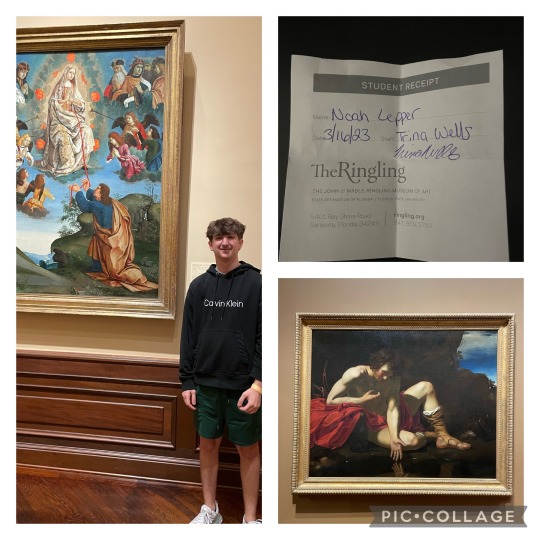
Narcissus by Gerard van Kuijl is a 114 cm x 143 cm painting and the media used is oil on canvas. This painting depicts a young man Narcissus sitting at the waters edge and looking at his own reflection within the water. There is a strong color difference between Narcissus and the environment, the environment is dark which makes you focus most of your attention on Narcissus. This artwork was a product of the Dutch Golden Age. Kuijl was well known for his religious works and was believed to see the first version of Narcissus which resided in Italy. This artwork shows that Kuijl put his own spin on one of the most famous paintings and highlights the message of the art by doing so. This artwork is very easy to understand because it is depicting such a famous story. The message is that once you become too obsessed with your own self and image, it will eat your life away. In the Narcissus’s story, he never left the water edge and died there, now a flower holds his name. Kuijl highlights this message even more by the use of light and shadow contrast that was influenced by Caravaggio. Kuijl uses this contrast so frequently that even the water in this painting is black. The shadow and light contrast is used to show that Narcissus’s obsession is consuming his life and the dark / shadow is consuming the painting. The importance of this artwork to society and the world is that this painting teaches us that becoming too obsessed with one’s self ends up being their demise. The painting shows the consequences for their obsession and we see how isolated Narcissus is. I think Kuijl made sure that he used more unity than variety because he wanted to keep that feeling of pure isolation when looking into this painting. The biggest factors in this painting are the color contrast and the use of unity to convey a sense of loneliness. I picked this artwork because it intrigued me at first and slowly I started to pick up on things. Then after researching and finding out the meaning of this artwork, I was able to pick up what I saw and relate it to the meaning. I like this painting because of that eerie feeling I got once I understood why Kuijl contrasted the light and dark idea throughout the painting.
0 notes